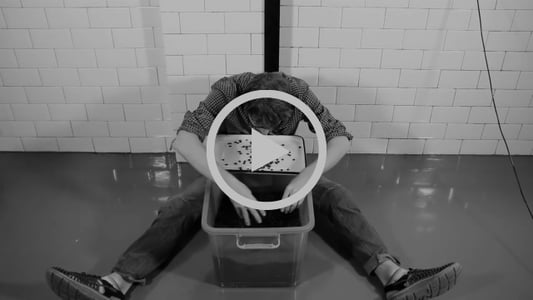Color Sorting: Is Carryover Rate Costing You?
5 minute read | written by Nicholas Flatoff

Co-Founder, Maxime Boegler, calibrates a SOVDA Pearl Mini Color Sorter.
If you’re looking into color sorters, you probably love quality coffee. You’ve likely seen machines that boast high accuracy rates. However, accuracy is one part of the process. And it’s just one factor that affects profits.
In this article, we’ll explain color sorter calibration. And we’ll explain why setting up the Pearl Mini on-site is necessary.
Accuracy: What Does it Mean?
Many optical sorters claim to be 99% accurate or more. But these numbers don’t tell the whole story. Take 20 grams of the washed Guatemalan coffee I’m drinking. With 113 beans, a 99% accuracy rate means you could still get one defective bean.
A 99% accuracy rate will not remove all of the quakers. The ideal accuracy is between 99.95% and 99.9995%, but this is rarely promoted. The challenge is to remove defective beans without losing good ones. Achieving this balance requires precise calibration. Imagine a defective bean passing through the machine. A burst of compressed air must push it into the reject channel. If the timing is slightly off, a good bean might be ejected.
The camera also directs the ejector. A small shift of seven-hundredths of a millimeter could cause the wrong beans to be removed. If calibration is not done on-site, factors like room brightness can affect the camera and cause errors.

The inside of a SOVDA Pearl Mini color sorter
Carryover: What Does it Mean?
The unintentional loss of good beans is called carryover. Carryover rate is the percentage of good coffee that’s being sorted out with the bad beans. Without proper calibration, machines can have carryover rates over 50%. At this rate, for every bad bean removed, you lose a good one.
Why We Require Onsite Commissioning?
At SOVDA, we understand the need for precise calibration. That’s why we include on-site setup with every Pearl Mini. This keeps carryover rates below 20%, often under 10%.

For example, sorting 1,000 kilos with a 50% carryover rate could cost you $300 in good beans. Reducing carryover to 20% lowers this to $75. Sorting pricier or higher-defect beans, like Ethiopian Naturals, saves even more.
We also love to do cuppings with your team. This shows how sorting affects flavor. (Over-sorting can give you a sweet, but dull, cup of coffee.)
Our standard commissioning service takes two days:
-
Day 1: We calibrate the machine.
-
Day 2: We train your staff to operate it and create sorting recipes.
Note: We also offer a three-day turn-key service for a quicker setup.
Summary
Many professionals are drawn to cheaper machines with high accuracy claims. But removing defective beans is only part of the process. Without on-site calibration, high carryover rates can waste good beans. And reduce your profits.
At SOVDA, our focus is on reducing carryover and saving your best beans. This ensures that your business stays profitable. And serves high-quality coffee.
Latest blog posts
Visit the blog Roastery
Roastery
How Automation Helps Roasters Protect Craft and Consistency
The Balance Between Craft and Growth In specialty coffee, roasting is more than a process. It is a promise to deliver consistency and ...

How can coffee roasters be more competitive?
Specialty coffee roasters invest valuable time and attention into hand sorting their coffee to remove defects. However, this tedious task ...
Better coffee awaits
Chat with our team to learn more about what SOVDA can do for you. Whether you want to refine your production or grow your business, we can help. Get in touch to perfect your roastery.